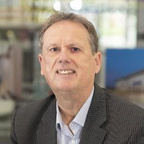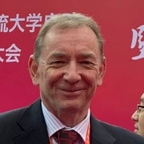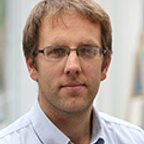|

|


Prof Paul Hogg
Emeritus Professor of Materials Engineering, Royal Holloway, University of London



Prof Ole Thomsen
Professor, School of Civil, Aerospace and Design Engineering, University of Bristol


9–10 April 2025
Coventry
|

|


Emeritus Professor of Materials Engineering, Royal Holloway, University of London



Professor, School of Civil, Aerospace and Design Engineering, University of Bristol



Professor of Polymer Processes, WMG, University of Warwick
Ton Peijs has been active in the field of polymers and composites for over 35 years. He received his PhD from Eindhoven University of Technology in the Netherlands and has published over 300 peer reviewed papers in scientific journals, conference proceedings and book chapters. He has given numerous invited and keynote lectures at international conferences and has successfully supervised over 40 doctoral students. He is the founding editor-in-chief of the journal 'Nanocomposites' (Taylor & Francis Publ.) and is on the editorial board of another 15 international journals in the field of materials. For Ton's publications on ORCID iD click the link below.
Reader in Polymers and Composites, WMG, University of Warwick
Dr Han Zhang is a Reader in Multifunctional Polymers and Composites at WMG, University of Warwick. Han is a Chartered Engineer (CEng), Chartered Scientist (CSci), Fellow of Institute of Materials Minerals and Mining (FIMMM), and Fellow of the Higher Education Academy (FHEA). Prior to joining WMG, Han was a Reader in Polymers and Composites and led the Composites group at Queen Mary University of London.
Han is the recipient of several prestigious awards, including the Silver Medal, a premier award from the Institute of Materials, Mineral and Mining (IOM3) in recognition of his outstanding contribution to the field of composite materials, the RH Craven Award in 2010 for his excellence in polymer materials. His research on energy efficient out-of-oven composites manufacturing has received the Composite award in 2024.
His research is recognised by a strong publication record (>4500 citations, h-index 35), with over 100 papers in peer-reviewed journals including Advanced Functional Materials, Composites Science and Technology, and Composites Part A .
Han serves as the Deputy Chair and Secretary of the Composites Leadership Team at the Institute of Materials, Mineral and Mining. Han is also the Assistant Editor of the Elsevier journal Composites Part A, and appointed member of the EPSRC Early Career Forum in Manufacturing and the Circular Economy.

Emeritus Professor of Materials Engineering, Royal Holloway, University of London
No bio provided

Senior Lecturer, School of Engineering, Ulster University
Dr Edward Archer is a Senior Lecturer of Advanced Composite materials in the School of Engineering and a member of the Engineering Research Institute. His research is focused on manufacturing and characterising 3D woven composite reinforcement structures and the prediction of their properties with key aspects of the work carried out in collaboration with major companies in several industrial sectors. He has recently been awarded a prestigious EPSRC grant to develop new composite materials. In addition, he has developed a bespoke composites training course for Aerospace professionals which he has delivered to 1200 Engineers in UK and Canada over the last 5 years. He has published many journal papers in this field and his research group operates both within the Engineering Composites Research Centre at Ulster and at Northern Ireland Advanced Composites and Engineering Centre (NIACE) in Belfast. He is Technical Director at the University spinout company Axis Composites Ltd. His contributions to advanced composite materials have recently been recognised by way of receipt of an ‘Honourable Mention’ certificate from Guy Hachey the President and Chief Operating Officer, Bombardier Global Aerospace.Ed graduated with a BEng in Mechanical Engineering and a PhD in polymer processing from Queen’s University Belfast and took employment with Irish Composites for 2 years before accepting a Research position at Ulster University in 2006.
Associate Professor, Composites Manufacturing, Faculty of Engineering
I am an Associate Professor at the University of Nottingham, where my research for the past 20 years has focussed on material and process developments for fibre reinforced polymer composites. I have particular interests in discontinuous fibre composites, which are suitable for producing sustainable, high volume components within the automotive sector. My research focusses on the development of automated manufacturing processes, which require an understanding of the underlying material science in order to offer technologies that are cost-competitive against traditional engineering materials. My work typically covers process development, process simulation and optimisation, which has significant industrial relevance.
The impact of my research has been far-reaching, reducing the mass and improving both the performance and economy of passenger vehicles. I co-developed the Directed Carbon Fibre Preforming (DCFP) process, in collaboration with Aston Martin Lagonda Ltd, which is a robotic chop and spray fibre delivery system for producing low cost, geometrically complex fibre preforms. I was responsible for developing a laboratory-scale manufacturing rig and a corresponding digital model to optimise the mesoscale material architecture, in order to minimise stochastic variability. This process made a significant contribution to the economic competitiveness of Aston Martin Lagonda, who employed the technique for the production of two structural components for the 12MY DBS, 12MY Virage, 13MY DB9 and Vanquish models. For the DBS model alone, 3,300 cars were sold in 42 countries at around £180,000 each, which equates to revenue of £594M. These two carbon fibre parts represented a weight saving of 52% and 44% compared to equivalent aluminium parts, with over 23 tonnes of material reaching the market. This work has received outstanding peer reviews, having featured as an impact case study in the 2014 REF exercise and has been disseminated in 16 journal publications to date (which have been collectively cited 514 times).
The thermoforming of complex composite parts has traditionally been difficult to automate, relies on labour intensive processes and generates large amounts of material waste (approximately 40% of fabric broad-goods). My most recent research has resulted in a simulation tool to optimise the manufacturing capability of continuous fibre preforms using an automated double diaphragm forming process. The simulation tool has been successfully used to perform virtual manufacturing studies to demonstrate that deep-draw parts can be produced with complex double curvature using low forming pressures. This has confirmed to a UK automotive OEM that automated forming can be achieved using low cost single-sided tooling for critical structural applications, underpinning the production of the next generation of McLaren carbon fibre supercar chassis in the UK. Project partner Hexcel Reinforcements Ltd (formerly Formax UK) has also developed new forming technologies from this research, reducing overall fabric waste to 5%. The successful outcomes from this project have helped to secure the future of Hexcel's R&T department in the East Midlands and added a significant new capability for Hexcel Corporation. This work has been disseminated in 11 journal papers to date, with the highest cited manuscript investigating the initiation and evolution of wrinkles during the fabric forming process.
My research track record and wide industrial network has led to many interesting consultancy projects with large OEMs and members of the composites supply chain, providing further opportunities for impact and knowledge exchange. Projects have ranged from producing composite demonstrator components for Airbus UK, Audi GmbH and Bentley Motors Ltd, to roadmaps and life-cycle assessments for Saudi Aramco and Nissan Motors respectively. One of the most noteworthy projects was working with the World Champion Freestyle Kayaker, James Reeves, to design and manufacture a high performance kayak using the DCFP process.

Professor, School of Civil, Aerospace and Design Engineering, University of Bristol
Ole Thybo Thomsen is Co-Director of Bristol Composites Institute, and NCC Chair in Composites Design and Manufacture at the Bristol Composites Institute, University of Bristol and the National Composites Centre. Previous positions: University of Southampton, UK; Aalborg University, Denmark; European Space Agency, European Space Research and Technology Centre, the Netherlands, the University of Delaware, Center for Composite Materials, USA; Technion, Israel. Prestigious appointments: European editor, Composites Part B: Engineering since 2018; Chairman, Innovation Fund Denmark, Research Council for Technology and Production Sciences 2012‐2014 (equivalent to EPSRC); Fellow, Danish Academy of Technical Sciences (equivalent to FREng) 2007; Knighthood, awarde by Her Royal Majesty Queen Margrethe II of Denmark, 2012. Authored >120 papers in Scientific journals. PI/co-I for numerous research grants through national and international research Funding agencies (Denmark, EU, USA, UK – total grant income in excess of £40M), involving close collaboration with industry and international research institutions. Main research interests: design, experimental and computational characterisation of lightweight composite structures. Chaired several international scientific conferences incl. the 20th International Conference on Composite Materials (ICCM20), Copenhagen 2015, with 2000 participants the largest conference ever on composites.

Professor of Composites Engineering, University of Plymouth
John Summerscales entered the composites sector 44 years ago, and after time with the Ministry of Defence (Navy) as a Higher Scientific Officer, he joined the academic staff at the University of Plymouth. He is now Professor of Composites Engineering and leads the MAterials and STructures (MAST) research group.
:
https://www.plymouth.ac.uk/staff/john-summerscales
:
johnsummerscales

Senior Lecturer, University of Sheffield
Dr Connie Qian is a Senior Research Fellow within the Automotive Composites Research Centre at WMG, and is the lead of the simulation team within ACRC. Prior to joining WMG in 2018, she was a PhD candidate and later a postgraduate research fellow based in the polymer composites group at the University of Nottingham, where she worked on a number of projects in multi-scale material modelling, structural analysis and optimisation and manufacturing process simulation for automotive composites.
:
https://www.sheffield.ac.uk/mac/people/mech-eng-academic-staff/connie-qian